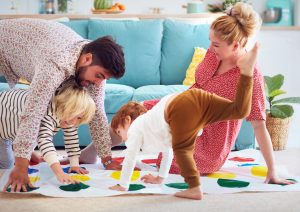
*This post is a continuation of the series based on Catholic HOM—Family Discipleship. Join the discussion in our facebook group.
There’s a lot in life that we have to take seriously. A lot to think about, a lot to manage, just… a lot. In the face of all this seriousness, one of the first things we adults lose is our ability to be playful.
Are problem solving and playfulness mutually exclusive?
A growing body of research has actually found that playfulness in our daily life has a large impact on our ability to handle challenges effectively, as well as increasing our overall life satisfaction.
______________________________________________________________
Do you want to cultivate greater joy and satisfaction in your family life? Check out
Parenting with Grace: The Catholic Guide to Raising (Almost) Perfect Kids
______________________________________________________________
Researchers from the University of Zurich and Pennsylvania State University teamed up to conduct a study on 533 participants. The participants were separated into three groups, two groups were given exercises pertaining to practicing and recording playfulness in their daily lives, the third group acted as a control group and were given exercises unrelated to the study.
The results found that those individuals who actively looked for ways to be playful in their daily lives reported greater life satisfaction even 12 weeks after the experiment took place, whereas the control group reported no difference. Furthermore, the results indicate that it is possible to teach individuals who are typically not prone to playfulness how to be more playful simply through intentional practice and participation in playful activities.
This study, as well as research conducted by Dr. Gordon Neufeld, shows that playfulness in our daily life actually increases our ability to process emotions and solve problems. Dr. Neufeld refers to playful activities as “emotional playgrounds,” stating, “When words fail us, emotional playgrounds are our best answer for safe emotional expression and for feelings to bounce back,” and that “Play is where we are most likely able to feel our emotions safely.” Neufeld and other research demonstrates that this is the case for both adults and children.
Research such as this highlights the significant importance of creating and maintaining family play rituals, like the ones we describe in the Liturgy of Domestic Church Life and the Rite of Family Rituals.
The ritual of play allows us to not only build rapport and connection as a family on a regular basis, but also creates the opportunity for these “emotional playgrounds.” Play enables us and our children to become more emotionally intelligent and emotionally healthy. We are able to problem solve, increase our emotional intelligence, and emotionally regulate more effectively, if we integrate play/playfulness into our regular, daily lives.
But how do we make time for this ritual of play on a daily basis?
Here are a few ideas:
– Start a family tickle fight when getting out of the car on your way home after soccer practice.
– Take turns bringing a joke to family dinner.
– Turn on your favorite music and have a dance party while picking up the living room or washing the dinner dishes.
– Sing your favorite songs in the car or snuggled up before bed.
– Read stories together and/or have your kids read to you while you get chores done (like folding the laundry).
– Take a walk together.
– Bake a yummy dessert.
– Integrate crafts into school activities and sit down and do them together.
– Have a family movie night, but make it special with your favorite pillows, blankets, and snacks.
– Play a card game during/after a meal
Start your own list of fun activities! Have everyone add to the list, hang it on the fridge, and pick one thing off the list that you have time for every day.
For more ideas on cultivating the ritual of play—and all the rituals of connection—in your family, join the discussion at Catholic HOM and visit us online at CatholicCounselors.com




